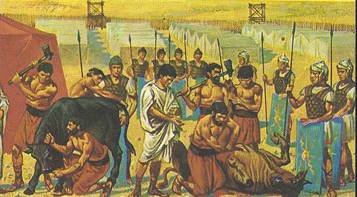Today we speak the words, “I am a World citizen,” with pride. To the people of the ancient world the statement, “I am a Roman citizen,” was a badge of high honour. Beginning as a small city state in Italy, Rome grew into a vigorous republic and finally into an empire so mighty that it included the whole of the Mediterranean world. Even after Rome’s grandeur had waned, its influence lived on among later peoples. Rome’s history is a reminder that the destiny of a nation rests more on the wisdom of its leaders and the character of its people …
Read More »Tag Archives: Livy
The City of Augustus 29 B. C. – A. D. 14
IN 29 B.C. the gates of war were closed. Rome was at peace. Senators and the people of the mob-men who had hated and fought each other through long, bitter years — stood side by side in the Forum while the great doors of the temple of Janus were slowly pushed shut. That had happened only twice before in the history of the city. The crowd in the Forum cheered the peace and they cheered Octavius, their new ruler. He was no longer the young man who had rushed to Rome after the murder of his uncle, Caesar. Seventeen years …
Read More »
